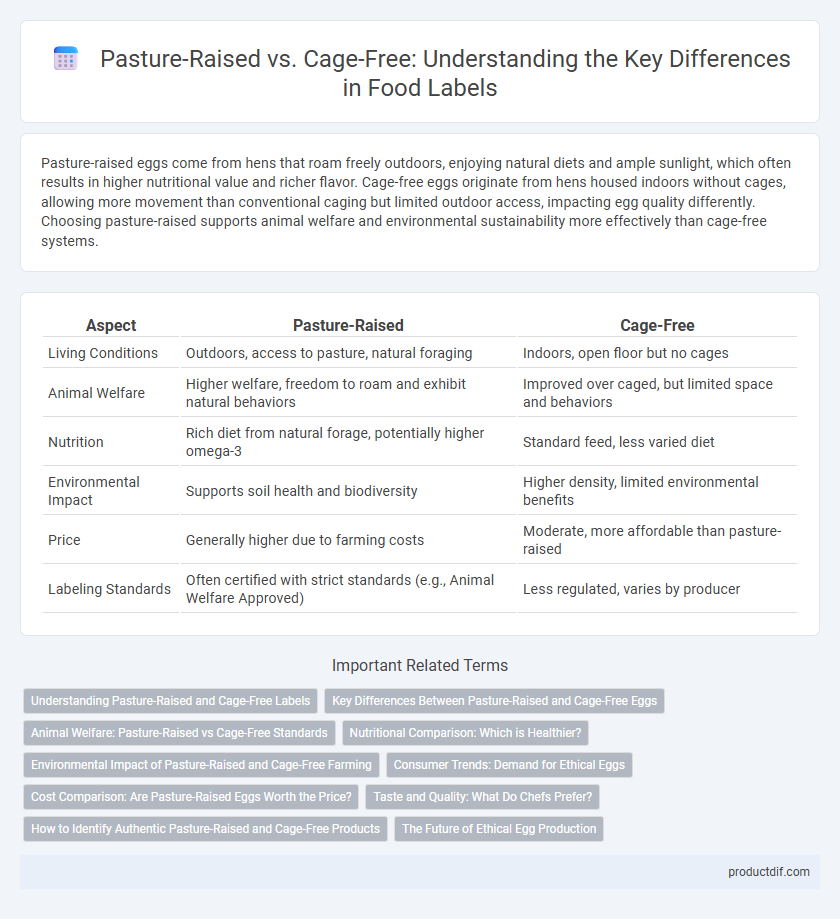Pasture-raised eggs come from hens that roam freely outdoors, enjoying natural diets and ample sunlight, which often results in higher nutritional value and richer flavor. Cage-free eggs originate from hens housed indoors without cages, allowing more movement than conventional caging but limited outdoor access, impacting egg quality differently. Choosing pasture-raised supports animal welfare and environmental sustainability more effectively than cage-free systems.
Table of Comparison
| Aspect | Pasture-Raised | Cage-Free |
|---|---|---|
| Living Conditions | Outdoors, access to pasture, natural foraging | Indoors, open floor but no cages |
| Animal Welfare | Higher welfare, freedom to roam and exhibit natural behaviors | Improved over caged, but limited space and behaviors |
| Nutrition | Rich diet from natural forage, potentially higher omega-3 | Standard feed, less varied diet |
| Environmental Impact | Supports soil health and biodiversity | Higher density, limited environmental benefits |
| Price | Generally higher due to farming costs | Moderate, more affordable than pasture-raised |
| Labeling Standards | Often certified with strict standards (e.g., Animal Welfare Approved) | Less regulated, varies by producer |
Understanding Pasture-Raised and Cage-Free Labels
Pasture-raised eggs come from hens allowed to roam outdoors on pasture, providing access to natural vegetation and insects, which enhances their nutritional value and flavor compared to cage-free eggs. Cage-free eggs originate from hens that live indoors without cages but lack outdoor access, meaning their living conditions are less natural than pasture-raised hens. Understanding these labels helps consumers make informed choices about animal welfare, nutrition, and environmental impact when buying eggs.
Key Differences Between Pasture-Raised and Cage-Free Eggs
Pasture-raised eggs come from hens that are allowed to roam freely outdoors on pasture, resulting in higher nutrient content and better animal welfare. Cage-free eggs are produced by hens that live indoors without cages but lack outdoor access, often leading to less natural behavior and different nutritional profiles. The primary distinctions lie in living conditions, dietary differences, and the impact on egg quality and ethical considerations.
Animal Welfare: Pasture-Raised vs Cage-Free Standards
Pasture-raised animals have continuous access to outdoor fields, allowing natural behaviors like grazing, foraging, and roaming, which significantly improves their overall welfare. Cage-free standards ensure animals are not confined to cages but often still live indoors with limited space and environmental enrichment compared to pasture-raised conditions. Studies show that pasture-raised methods reduce stress and promote better physical health, making them a superior choice for animal welfare.
Nutritional Comparison: Which is Healthier?
Pasture-raised eggs contain higher levels of omega-3 fatty acids, vitamin D, and beta-carotene compared to cage-free eggs, due to the hens' access to natural forage and sunlight. Cage-free eggs offer better nutrient profiles than conventional caged eggs but typically contain lower concentrations of essential nutrients than pasture-raised ones. Choosing pasture-raised eggs can lead to increased intake of heart-healthy fats and antioxidants, promoting overall better health outcomes.
Environmental Impact of Pasture-Raised and Cage-Free Farming
Pasture-raised farming promotes soil health and biodiversity by allowing animals to graze naturally, which reduces the need for synthetic fertilizers and pesticides. Cage-free systems improve animal welfare but often rely on higher resource inputs and produce more waste concentrated in confined areas, potentially impacting local ecosystems. Sustainable pasture-raised practices can lower greenhouse gas emissions and improve carbon sequestration compared to conventional cage-free operations.
Consumer Trends: Demand for Ethical Eggs
Consumer demand for ethical eggs increasingly favors pasture-raised options due to perceptions of higher animal welfare standards and environmental sustainability. Pasture-raised eggs typically come from hens allowed to roam freely outdoors, resulting in superior nutritional profiles and better taste, driving market growth. Cage-free eggs also see rising popularity, yet pasture-raised remains the preferred choice among ethically conscious consumers seeking transparency and responsibly sourced products.
Cost Comparison: Are Pasture-Raised Eggs Worth the Price?
Pasture-raised eggs typically cost two to three times more than cage-free eggs due to higher land use and feed expenses. The increased price reflects improved animal welfare and richer nutrient profiles, including higher omega-3 fatty acids and vitamins. Consumers prioritizing ethical farming practices and nutritional benefits often find pasture-raised eggs worth the premium despite the higher cost.
Taste and Quality: What Do Chefs Prefer?
Chefs often prefer pasture-raised eggs and meat for their richer, more complex flavors due to the animals' natural diets and freedom to roam, which enhances texture and overall quality. Cage-free products, while more humane than conventional caged options, typically offer milder taste profiles and less nutrient density. Ultimately, top chefs prioritize pasture-raised for superior flavor and quality in culinary applications.
How to Identify Authentic Pasture-Raised and Cage-Free Products
Look for certification labels such as Animal Welfare Approved or Certified Humane to identify authentic pasture-raised and cage-free products, as these organizations enforce strict animal welfare standards. Verify product packaging for detailed descriptions of farming practices, including outdoor access, for pasture-raised claims, and indoor living conditions for cage-free eggs or meat. Research the brand's transparency and third-party audits online to ensure the authenticity of these claims and support ethical food choices.
The Future of Ethical Egg Production
Pasture-raised eggs come from hens allowed to roam freely outdoors, promoting natural behaviors and superior animal welfare compared to cage-free systems, where hens live indoors without cages but with limited space. Advances in ethical egg production emphasize sustainable farming practices and transparency, responding to consumer demand for humane treatment and environmental responsibility. Future trends include integrating regenerative agriculture principles and enhanced welfare certifications to ensure higher standards for both animals and ecosystems.
Pasture-raised vs Cage-free Infographic

 productdif.com
productdif.com